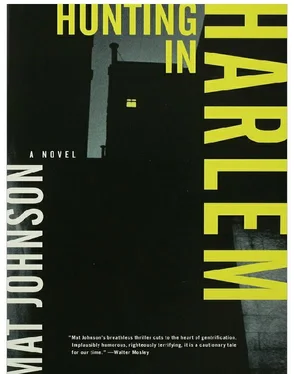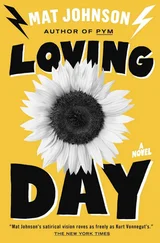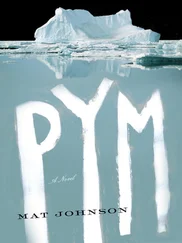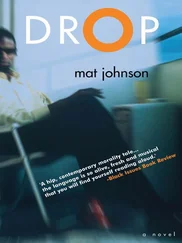Unfortunately, The Great Work's reviews proved a harbinger for the reaction of the few readers it managed to attract. Though no readings were ever actually conducted for The Great Work (several were arranged, but no one showed up; even the bookstore clerks called in sick), Bobby Finley was still able to determine this by months of long hours of searching newsgroups on the Internet. Bobby Finley took no solace from the fact that all three people who mentioned The Great Work lacked the imagination to use any descriptor other than a conjugation of the verb to suck.
The purpose of the author's own collection of The Great Work changed dramatically after his first and only signing. A clerk at the black bookstore in the New Carrellton Mall put an accidental zero on the order form and after seven months local author Bobby Finley was called in an effort to move the twenty copies. In an attempt to assist him in this endeavor, the owner had booked Bobby Finley, author of The Great Work, to appear on the same day, at the same time as Bo Shareef, best-selling author of Datz What I'm Talking* 'Bout.
The two sat at opposite ends of one long fold-out, a fortress of Datz What Im Talkin' 'Bout piled across the table, floor, and back wall on one side, twenty copies of The Great Work in two neat piles on the other. Shareef's publisher had outfitted him with blown-up images of the book and the author big enough to shame Mussolini. In the brief moment Bobby had a chance to speak with Mr. Shareef, he did find him friendly and charismatic, but it was the last chance they would have to talk as Bo Shareef was quickly swallowed by a mob of women Bobby had previously assumed to be the assembling of a large gospel choir.
Three hours. It seemed as if every black woman in the DC Metro area had been bused in for the occasion. Shocked by the display, Bobby Finley faked a cough, reached back to his bag for his water and then leaned over and vicked a copy of Datz What I'm Talkin' 'Bout. A far cry from The Great Work's dignified all-white cover with the tide in black twelve-point Courier font, the cover of Datz What I'm Talkin' 'Bout looked like a panel from a self-published children's book. Upon inspecting the first sentence, first paragraph, first page, and first chapter, Bobby found prose with the originality, sophistication, and poetry of the instructions that came with Happy Meal toys. Yet the crowd kept coming. "You are the greatest, Mr. Shareef," they said. "Oh my God, I can't wait for your next one," they told him.
Bobby read Datz What I'm Talkin' 'Bout in its entirety, right there at the table, too numb to be embarrassed. Of the handful of people that did stop by Bobby's side after the long wait for Bo Shareef's signature, few refrained from making a face when Bobby explained the plot of The Great Work. One said, "Alaska? There ain't no black people in Alaska." Those who didn't tried to get him to give them copies for free. One brother with what looked like a queen-sized bedsheet wrapped around his head demanded to know what his "thesis" was.
Years had gone into crafting The Great Work. Years had gone into crafting single sentences within it. Authors' entire life works were reread just to inspire certain paragraphs.
Bobby felt like a chef who had dedicated his life to the study of the greatest culinary techniques, practiced for years to perfect them before presenting his finest dish to the public, only to be outdone by a guy who walked in off the street, shit in a tortilla, and deep-fried it.
Reeling from the public's failure to recognize the genius of The Great Work, Bobby Finley resolved to determine the reason. That's when he decided that the readers were dung beetles. That they didn't just consume crap, they liked it. That the critics, of course, were much less than that. That there was no one worth writing for.
Snowden, who'd already made a point of admitting he thought Bo Shareef was "the bomb" before Bobby's story unfolded, could take no more. "Dude, did you ever even ask yourself if it ain't the other way around? Like, oh, I don't know, maybe every other human being in the world is right and you're the one that's wrong. Maybe The Great Work just sucks. You ever think of that?"
"Yeah, I thought about that for a minute. But then I reread it. It's brilliant, they're dung beetles, trust me on this one."
The world didn't deserve The Great Work, at least not in this century. So with renewed effort, Bobby spent what little money he had reacquiring every one of its three thousand copies. Besides Harlem and Horizon, Bobby's favorite thing about New York City was its used bookstores, the Strand and Gotham Book Mart, where he spent his money and free time. Also, that there were several Ikea furniture stores in the area, as The Great Work could often be found being used as a bookshelf prop in their faux living room sets. The books weren't for sale, but that was OK because those he stole on principle.
Snowden, having been unimpressed with the three pages he'd managed to plow through of The Great Work, didn't care if it remained Robert M. Finley's only published novel. What annoyed Snowden, particularly since they'd decided to become drinking partners, was that once he got his blood alcohol level up, Bobby Finley never stopped talking about the world he'd abandoned, particularly his theory on the way it worked. Since his mall-front "awakening," Bobby had determined that there were only two roads to success for a male writer of African descent, such as he was. The first was to write a romance novel with an illustration of three or fewer attractive black people on the cover, preferably done in a comic book style so as not to scare off the illiterate. One written in flat descriptions of every action so that the prose was completely subservient to the plot, even though that plot was invariably predictable, as close to the readers' expectations as possible so as not to scare them. This type of book was basically for a readership looking for melaninized, low-tech versions of their afternoon soaps.
"If I wanted to, if I just gave up on humanity completely and wanted to sell out, I could make a million, no problem. I'd just excrete some story about a guy dating four women, but then they find out and get even with him, maybe he ends up married to one, some dumb shit like that. I'd give it a clichéd tide spelled with a bunch of useless Ebonic abbreviations. I could write it in a weekend."
Even more insidious, Bobby liked to declare, was the path toward black male literature. At some point it had been decided that the role of a black male writer was to create a work in the vein of Richard Wright or the great Ralph Ellison, not in the sense that the works be original and energetic, but that they focus on inner-city strife and racism. Whites, who made up the majority of sales in the literary category, felt their own writers could handle the other issues in the universe just fine, they just wanted the black guys to clarify the Negro stuff. The author would do best to deal with those issues in a predictable, derivative manner, as these readers were looking for confirmations of their viewpoints, not new ones. Bobby insisted that works were reviewed, awarded, and hailed based on this principle.
"Snowden, believe me when I say this, if I wanted to, I could produce a critical hit, full-page rave in the Times, TV interviews, no problem. I would just pump out another thing about this poor black person struggling to overcome white racism, inner-city violence, or poverty or, even better, all three. Are you kidding? That's a whole cottage industry. Dung beetles love that stuff. I'll even throw some hip-hop references on top, 'cause you know dey want it all authentic V topical 'n'shit. Nobody ever went broke giving people what they think they want."
Читать дальше












